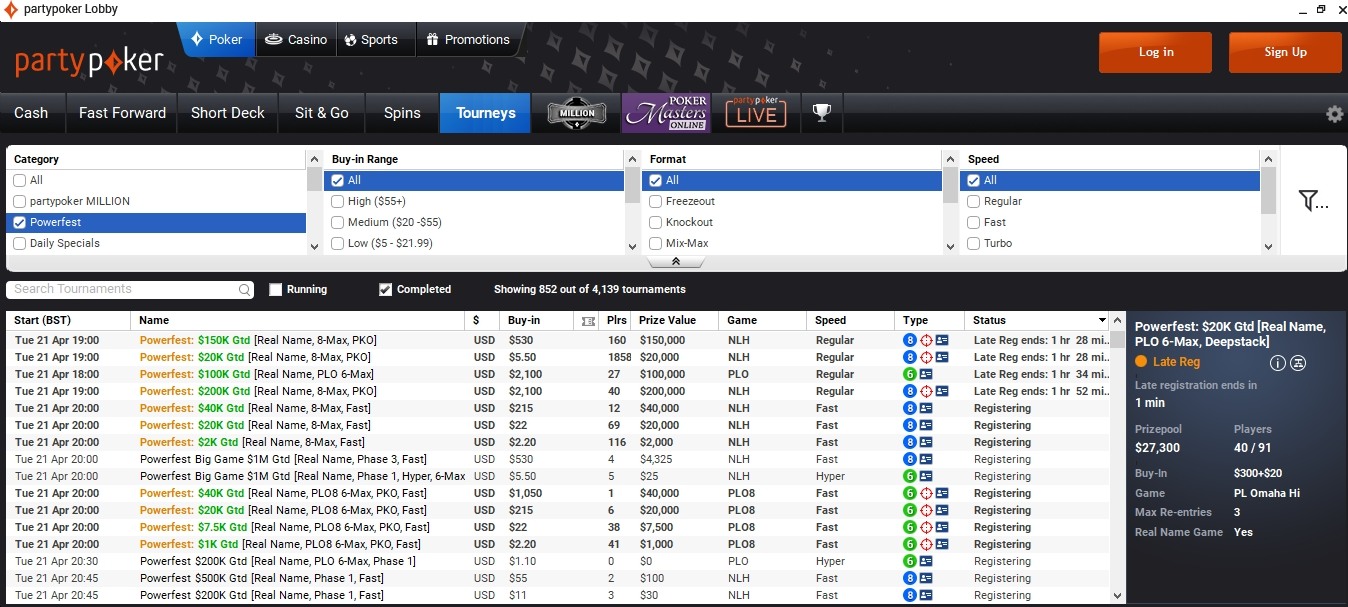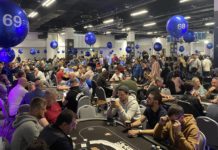Partypoker is using the current surge in online activity to conduct a social experiment and, potentially, create a safer, more interactive online poker environment.

Partypoker is testing real name MTTs in a bid to change online poker for the better. (Image: Partypoker)
In a tweet published on Saturday, Partypoker advisor Rob Yong announced that the new Powerfest series will feature “real name” MTTs.
The idea went live on April 20 and will continue for two weeks. This means anyone that enters a Powerfest event will have their name visible for all to see.
Transparency Over Anonymity for Powerfest
The premise of real-name MTTs is simple, but the long-term implications may not be. On the one hand, Partypoker is breaking a long-standing tradition in online poker by asking players to show their true identities.
However, the experiment could also usher in a new culture of transparency and security. With both high on everyone’s list of priorities, any innovations that can make online poker safer would likely be welcomed.
In practice, this isn’t the first time Partypoker has pulled back the curtain. As part of an ongoing commitment to safety and fairness, the site introduced real-name cash games in August 2019. The software update received a mixed reaction from the poker community.
While some acknowledged the feature could make the game more transparent and, therefore, reduce instances of cheating, others weren’t convinced.
“If it ever becomes mandatory, the most significant drop off in numbers will be recreational players, because people won’t want it to be public knowledge that they’re losing a ton of money,” tomsOn wrote on 2+2.
In addition to potentially scaring off novices, concerns regarding internet security were raised. Online, screen names are often a form of protection. Without being able to see someone’s real name, criminals have one less piece of information to exploit.
Partypoker Promoting Safety and Community
For Yong and Partypoker, the experiment is as much about creating a sense of community as it is about improving safety standards. In his April 18 tweet, Yong described the idea as a “social experiment” and referenced Matt Savage.
Over the last three years, Savage has trialed a number of ideas at tournaments around the world. His primary objective in almost all instances is to make poker a more communal, enjoyable experience.
The best example of this came in 2017 when he banned accessories at the table. The $350 tournament was part of the California State Poker Championship, and dubbed the “social experiment.”
Players who anted up at the Commerce Casino weren’t allowed to wear sunglasses, hoodies, or headphones. Electronic devices were also banned at the table.
The aim was to create more “social interaction” and, in turn, make the game more enjoyable for recreational players. Partypoker is aiming to do something similar with its real-name MTTs.
Positives and Negatives on Both Sides
When Partypoker first introduced the idea in 2019, “community” was the operative word. Asking players to reveal their true identities has the power to create more personal relationships between competitors. Moreover, when people can’t hide behind a screen name, they’re more likely to be respectful to others.
The concept of real-name MTTs is certainly interesting. They could improve transparency, increase safety, and foster a greater sense of community, all of which would arguably make online poker more attractive for many players.
The question is, however, at what cost? Determining that could be the reason why the results of Partypoker’s experiment may be more significant than many might expect.












